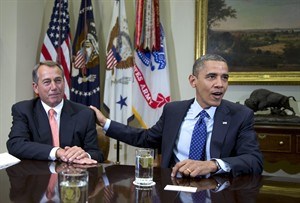
FILE - In this Nov. 16, 2012, file photo, President Barack Obama acknowledges House Speaker John Boehner of Ohio while speaking to reporters in the Roosevelt Room of the White House in Washington, as he hosted a meeting of the bipartisan, bicameral leadership of Congress to discuss the deficit and economy. The 63-year-old speaker has been caught up ever since in a monumental struggle over taxes and spending aimed at keeping the country from taking a yearend dive over the "fiscal cliff." Obama is tugging Boehner one way in pursuit of a budget deal, while conservatives yank the other way, some howling that the speaker already is going wobbly on them and turning vindictive against those in his party who dare disagree. (AP Photo/Carolyn Kaster, File)
December 17, 2012 - 9:56 AM
WASHINGTON - President Barack Obama and the Republican leader of the U.S. House met at the White House on Monday in hopes of continuing to make progress on a plan to deal with a fiscal crisis that threatens the U.S. economy.
The two negotiators are running out of time if they hope to make an agreement and get it passed by Congress before the so-called fiscal cliff strikes at the beginning of January when an economically toxic mix of huge tax increases and slashing cuts to the Pentagon and other federal agencies begins to take effect.
The meeting came after Speaker John Boehner on Friday offered $1 trillion in higher tax revenue over 10 years and an increase in the top tax rate on people making more than $1 million a year, his first move in Obama's direction on rates.
Boehner is also offering a large enough extension in the government's borrowing cap to fund the government for one year before the issue must be revisited — conditioned on Obama's agreeing to the $1 trillion in spending cuts.
"The president and the speaker are meeting at the White House to continue their discussions about the fiscal cliff and balanced deficit reduction," said Boehner spokesman Michael Steel. The two met for about 45 minutes, officials said.
The idea is to set the broad parameters of an agreement while leaving other steps, like overhauling the tax code and additional cuts to popular programs like health care for the elderly, to be fleshed out next year.
Obama is also pushing extending jobless benefits for the long-term unemployed and wants an some kind of extension of a payroll tax cut.
Boehner's latest offer broke a long impasse. It calls for about $450 billion in revenue from increasing the top rate on million-dollar-plus income from 35 per cent to the Clinton-era rate of 39.6 per cent.
The additional revenue required to meet the $1 trillion target would be collected through a rewrite of the tax code next year and by slowing the inflation adjustments made to tax brackets.
In return, Boehner is asking for $1 trillion in spending cuts from government benefit programs like health care for the elderly. Those cuts would defer most of a painful set of across-the-board spending cuts set to slash many domestic programs and the military budget by 8-9 per cent, starting in January.
Boehner's proposal was described Sunday by officials familiar with it. They required anonymity because of the sensitivity of the talks.
Boehner also continues to press for a less generous inflation adjustment for government pension benefits, a move endorsed by many budget hawks. Obama and Democrats on last year's deficit "supercommittee" endorsed the idea in offers made last year, but they're more reluctant now.
The new inflation adjustment would also raise about $70 billion over a decade in new revenues because tax brackets would rise more slowly for inflation, driving people more quickly into higher tax brackets.
The increased optimism come as time is running out before the adjournment of Congress. Tax rates on all workers go up in January, and $109 billion worth of across-the-board spending cuts begin to take effect then as well. Taken together with the expiration of extended jobless benefits and a 2-percentage-point break in payroll taxes, the combination of austerity steps threatens to send the economy back into recession.
The burst of optimism is tempered by the caution that the remaining steps to reaching a deal — particularly how much to cut health care for the elderly and whether to impose the new, less generous inflation adjustment to government pension payments — are difficult. Then comes the job of selling it to a polarized Congress, where Republican conservatives have been railing against higher tax rates for months as sure to cost jobs and hurt small business, and Democrats have taken a harder line against cost curbs to health care for the elderly.
News from © The Associated Press, 2012